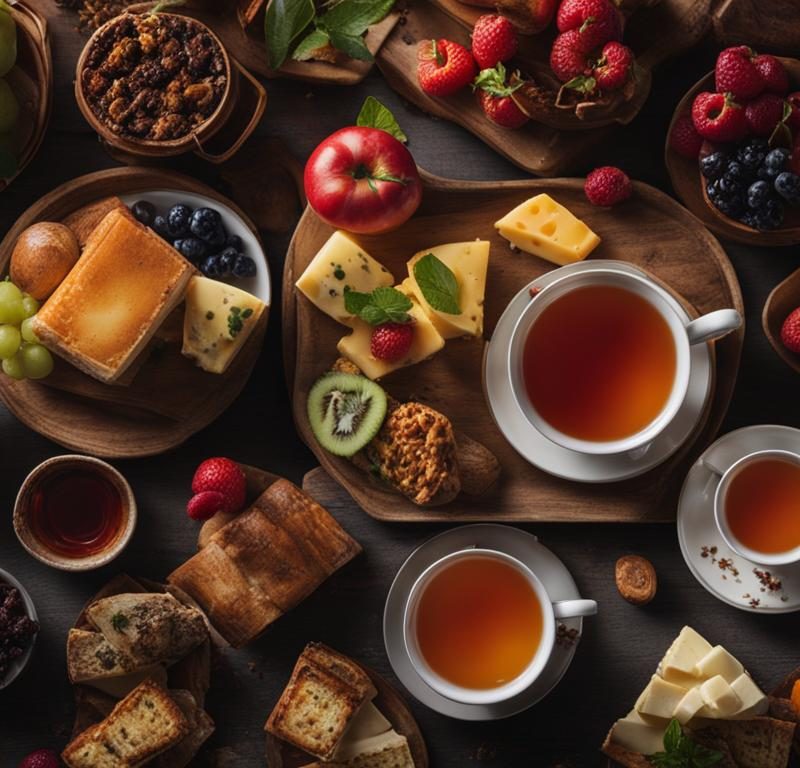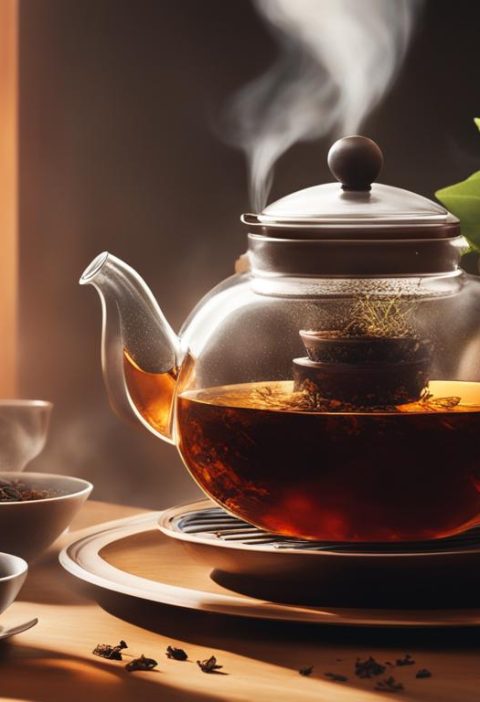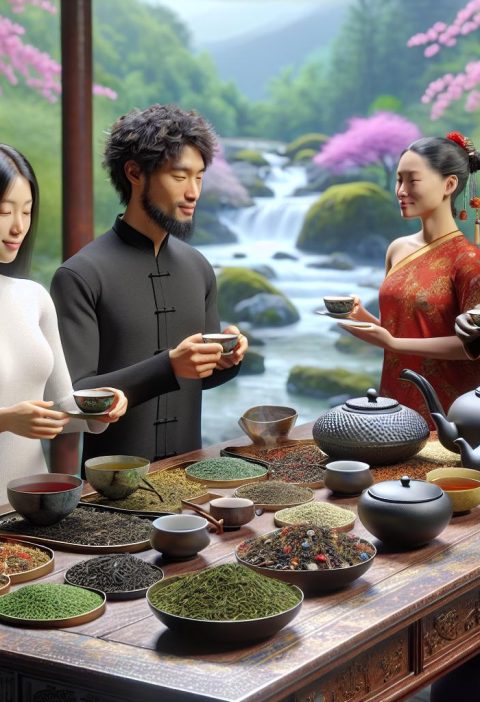Tea pairing is an art that involves finding the perfect match between different types of tea and food. Whether you’re a tea connoisseur looking to enhance your tea-drinking experience or a culinary enthusiast exploring new flavor combinations, understanding the principles of tea and food pairing is essential. In this comprehensive guide, we will share expert tips, best combinations, and delightful menus to help you create harmonious flavor pairings. From green tea and seafood to black tea and chocolate, we will delve into the world of tea pairings, providing you with a detailed understanding of how to find the perfect match for your taste buds.
Key Takeaways:
- Tea pairing is an art that involves pairing different types of tea with complementary flavors.
- Understanding the flavor profiles of both the tea and the food is crucial for successful pairings.
- Green tea pairs well with light and refreshing seafood dishes.
- Black tea complements the richness of chocolate and other sweet treats.
- Oolong tea enhances the flavors of spicy dishes.
Understanding Tea and Food Pairing
When it comes to tea and food pairing, we must consider the flavor profiles of both the tea and the food. Different teas have distinct flavor notes, ranging from delicate and grassy to bold and rich. To create a successful pairing, it is essential to match the intensity, weight, and flavors of the tea with those of the food. By understanding the characteristics of different teas and the types of dishes they complement, you can elevate your tea drinking experience.
Tea pairing is an art that involves finding the perfect harmony between the flavors of the brewed tea and the accompanying food. The right combination can enhance the taste of both elements, creating a delightful sensory experience. Whether you’re a tea connoisseur or a beginner exploring the world of tea, understanding the principles of tea and food pairing will guide you towards creating memorable moments.
When selecting a tea to pair with food, consider the following aspects:
- Flavor Notes: Different teas offer a variety of flavor profiles, including floral, grassy, earthy, nutty, and smoky. Understanding these flavor notes will help you create harmonious combinations.
- Intensity: Match the intensity of the tea with the intensity of the dish. Delicate teas might be overwhelmed by heavily flavored foods, while bold teas can overpower subtle dishes.
- Weight: Consider the weight or body of the tea and the food. Light-bodied teas pair well with light dishes, while full-bodied teas can stand up to heavier and richer flavors.
- Complementary Flavors: Look for flavors in the tea that complement or contrast with the flavors in the food. The right pairing can enhance and balance the taste experience.
By experimenting with different tea and food combinations, you can unlock a world of flavors and discover unique pairings that are pleasing to your palate. Whether you’re enjoying a casual meal or hosting a special event, tea and food pairing can elevate your dining experience to new heights.
Pairing Green Tea with Seafood
When it comes to tea and food pairing, one delightful combination to explore is pairing green tea with seafood. Green tea has a delicate, grassy flavor that complements the lightness and freshness of seafood dishes.
For those who appreciate Japanese cuisine, sushi, sashimi, and ceviche are excellent choices to pair with green tea. The mild flavors of these dishes allow the natural sweetness of green tea to shine through.
Green tea’s unique characteristics, such as its grassy notes and refreshing finish, make it a perfect accompaniment to seafood’s subtle flavors. The tea acts as a palate cleanser, providing a gentle balance to the rich textures and umami of seafood dishes.
| Seafood Dish | Recommended Green Tea |
|---|---|
| Sushi | Sencha |
| Sashimi | Gyokuro |
| Ceviche | Matcha |
Experience the Harmony of Flavors
Pairing green tea with seafood provides a unique culinary experience. The delicate and vibrant flavors of green tea enhance the freshness and lightness of seafood, creating a harmonious balance of tastes.
- Green tea’s grassy notes complement the delicate flavors of sushi.
- Pairing sashimi with green tea, such as gyokuro, enhances the umami of the fish.
- Green tea, like matcha, adds depth to the citrusy flavors of ceviche.
These tea and food pairing combinations not only elevate the dining experience but also offer a refreshing and healthy option, as green tea is known for its antioxidant properties.
Whether you are a seafood enthusiast or a tea lover, exploring the pairing of green tea with seafood opens up a world of delightful flavors and enhances the enjoyment of both tea and food.
Pairing Black Tea with Chocolate
Black tea, with its bold and rich flavor profile, is a perfect companion to chocolate and other sweet treats. The robustness of black tea enhances the sweetness of chocolate, creating a delightful and satisfying pairing experience. Indulge in a cup of black tea alongside chocolate cake, brownies, or truffles for a luxurious treat. Let the flavors of the tea and chocolate intertwine, elevating your enjoyment to new heights.
When pairing black tea with chocolate, consider the balance of flavors and textures. The deep and complex notes of black tea complement the richness and creaminess of chocolate, creating a harmonious combination. The tannins in black tea help cleanse the palate, preventing the sweetness of chocolate from becoming overwhelming.
To truly savor the black tea and chocolate pairing, here are some exquisite suggestions:
1. Dark Chocolate with Assam Black Tea
The robust flavor of Assam black tea pairs beautifully with the intense richness of dark chocolate. The earthy and malty undertones of Assam black tea complement the bittersweet flavors of dark chocolate, creating a luxurious combination.
2. Milk Chocolate with Darjeeling Black Tea
Darjeeling black tea, known for its delicate and floral notes, harmonizes beautifully with the creamy sweetness of milk chocolate. The light and aromatic characteristics of Darjeeling black tea provide a refreshing contrast to the silky smoothness of milk chocolate.
3. White Chocolate with Ceylon Black Tea
The subtle and buttery flavors of white chocolate pair wonderfully with the bright and citrusy undertones of Ceylon black tea. The smooth texture of white chocolate complements the light and refreshing qualities of Ceylon black tea, delivering a delightful combination.
| Tea | Chocolate |
|---|---|
| Assam Black Tea | Dark Chocolate |
| Darjeeling Black Tea | Milk Chocolate |
| Ceylon Black Tea | White Chocolate |
Experimenting with different black tea and chocolate pairings can be a fun and delicious adventure. The depth of flavors and the combination of textures will surprise and delight your taste buds. Whether you prefer a strong black tea with a decadent dark chocolate or a delicate black tea with a creamy milk chocolate, the possibilities are endless.
So, the next time you reach for a piece of chocolate, remember to savor it alongside a comforting cup of black tea. Let the flavors mingle and unfold, creating a taste experience that is truly delightful.
Pairing Oolong Tea with Spicy Dishes
Oolong tea, with its complex flavor profile of floral, fruity, and smoky notes, is a perfect match for spicy dishes. The unique characteristics of oolong tea add depth and complexity to the culinary experience.
When it comes to pairing oolong tea with spicy dishes, consider selecting teas that can balance the heat and enhance the flavors of the spices. Thai curries, Indian biryanis, and Mexican mole are just a few examples of spicy dishes that can be wonderfully complemented by oolong tea.
Oolong tea’s floral and fruity notes can help cool down the spiciness of these dishes, while its smoky undertones provide a robust backdrop that elevates the overall flavor profile. The tea serves as a refreshing palate cleanser between bites, creating a harmonious balance of tastes.
To fully enjoy the pairing of oolong tea with spicy dishes, here are some helpful tips:
- Choose oolong teas with medium to full body and complex flavor profiles.
- Experiment with different types of spicy cuisine, such as Thai, Indian, or Mexican, to discover your favorite combinations.
- Consider the level of spiciness in the dish and select oolong teas that can complement and balance the heat.
- When serving oolong tea with spicy dishes, allow the tea to steep for the recommended time to ensure optimal flavor extraction.
- Pair oolong tea with side dishes like rice or noodles to create a more satisfying and complete meal experience.
Examples of Oolong Tea Pairings with Spicy Dishes
| Spicy Dish | Recommended Oolong Tea |
|---|---|
| Thai Red Curry | Tie Guan Yin |
| Indian Chicken Biryani | Dong Ding |
| Mexican Mole | Da Hong Pao |
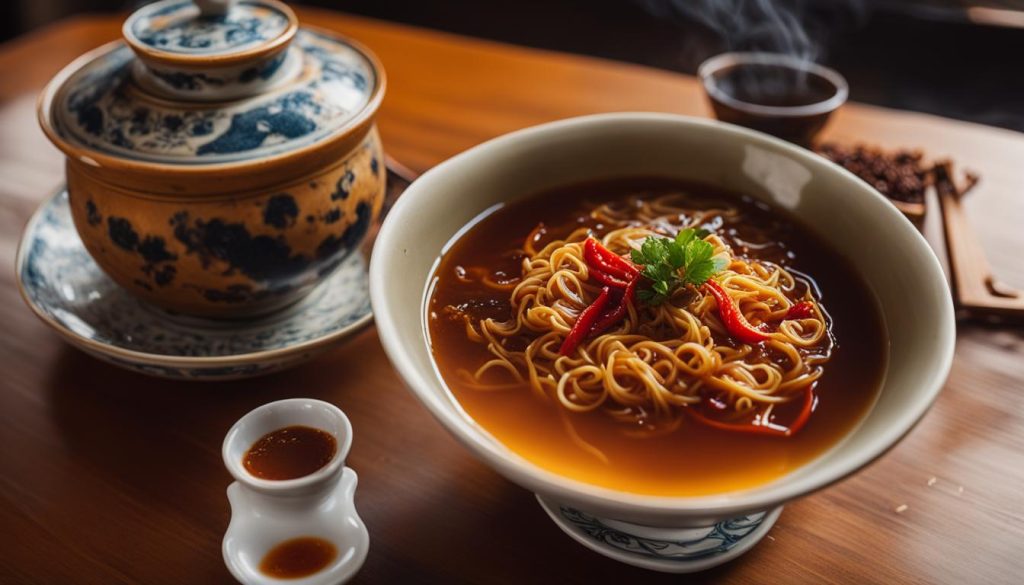
Pairing Herbal Tea with Fruit Desserts
When it comes to tea pairing, don’t overlook the delightful combination of herbal tea and fruit desserts. Herbal teas like chamomile, peppermint, and rooibos have a sweet and floral flavor that beautifully complements the natural sweetness of fruit-based desserts. Whether you’re enjoying a slice of apple pie, a warm peach cobbler, or a delectable berry crumble, herbal tea can enhance the overall dessert experience.
The refreshing and aromatic qualities of herbal teas bring a sense of balance to the fruity flavors, creating a harmonious pairing that tantalizes the taste buds. Not only does herbal tea add depth and complexity to the dessert, but it also provides a soothing and relaxing complement to the sweetness of the fruits.
Tea Pairing Combinations: Herbal Tea and Fruit Desserts
Here are some delicious tea pairing combinations to elevate your fruit dessert experience:
- Chamomile tea with apple pie
- Peppermint tea with peach cobbler
- Rooibos tea with berry crumbles
Each combination offers a unique blend of flavors, allowing the herbal tea to enhance and complement the specific characteristics of the fruit dessert.
| Herbal Tea | Fruit Dessert |
|---|---|
| Chamomile | Apple Pie |
| Peppermint | Peach Cobbler |
| Rooibos | Berry Crumbles |
Whether you prefer the calming notes of chamomile or the invigorating aroma of peppermint, herbal tea pairing with fruit desserts is a delightful treat for your taste buds. The combination of the sweet and fruity flavors of the dessert with the delicate and aromatic notes of herbal tea creates a sensory experience that is both refreshing and satisfying.
Pairing White Tea with Light Salads
White tea, known for its delicate and sweet flavor, is a perfect match for light, refreshing salads. Enjoy white tea alongside salads made with cucumber, watermelon, feta, or mixed greens with citrus dressing.
The lightness of the white tea complements the freshness and crispness of the salads, creating a harmonious combination. The subtle flavors of the tea enhance the natural flavors of the salad ingredients, resulting in a delightful and satisfying culinary experience.
White Tea and Light Salad Pairing Menu
For a refreshing tea pairing menu, consider the following combinations:
- White tea with a cucumber and mint salad
- White tea with a watermelon and feta salad
- White tea with mixed greens and citrus dressing
These light salads complement the delicate flavors of white tea, providing a light and flavorful meal option. Whether you’re looking for a light lunch or a refreshing side dish, pairing white tea with light salads is sure to satisfy your palate.
Pairing Pu-erh Tea with Rich, Fatty Dishes
Pu-erh tea, with its deep, earthy flavor, complements rich, fatty dishes perfectly. The robustness of this tea balances the richness of the accompanying dishes, creating a truly satisfying and indulgent pairing experience. Whether you’re serving roasted meats, creamy cheeses, or buttery pastries, pu-erh tea enhances the flavors and elevates your culinary journey.
Here are some tips to create the perfect pu-erh tea and rich dishes pairing:
- Match the intensity: Opt for a bold and full-bodied pu-erh tea to match the richness of the dish.
- Contrast flavors: The deep, earthy notes of pu-erh tea provide a delightful contrast to the richness of the fatty dishes.
- Avoid overpowering the flavors: While pu-erh tea can handle the richness, be mindful not to overpower the flavors of the dishes. Balance is key.
- Experiment with different textures: Pair pu-erh tea with dishes that have varying textures to create a dynamic and enjoyable experience.
- Consider the temperature: Serve pu-erh tea hot to complement the warmth and richness of the dishes.
Example Pu-erh Tea and Rich, Fatty Dishes Pairing Menu:
| Rich, Fatty Dish | Pu-erh Tea |
|---|---|
| Roasted Duck | Yunnan Gold Pu-erh |
| Triple Cream Brie | Aged Pu-erh |
| Beef Wellington | Ripe Pu-erh |
Elevate your dining experience by exploring the rich and complex flavors of pu-erh tea paired with indulgent, fatty dishes. The deep, earthy notes of pu-erh tea beautifully complement the richness, creating a truly satisfying and harmonious combination.
Japanese Tea and Food Pairing
Japanese tea is deeply rooted in the country’s rich cultural heritage and is often enjoyed alongside meals, snacks, and sweets. The art of tea pairing is highly regarded in traditional Japanese tea ceremonies, where the delicate balance of flavors and the harmonious pairing of specific teas with different types of food are emphasized. One classic and delightful pairing in Japanese cuisine is the combination of Japanese tea with rice crackers, particularly genmaicha with brown rice crackers, also known as osenbei. This traditional duo brings together the nutty flavors of genmaicha and the satisfying crunch of rice crackers, creating a well-rounded and authentic experience.
Genmaicha, a type of Japanese green tea, is known for its unique flavor profile. It combines the freshness and grassy notes of green tea with the nuttiness of roasted brown rice, resulting in a pleasant and comforting taste. This tea is often paired with osenbei, which are savory rice crackers that come in various shapes and flavors. The combination of genmaicha and brown rice crackers creates a delightful contrast of flavors and textures, making it a popular choice among tea enthusiasts.
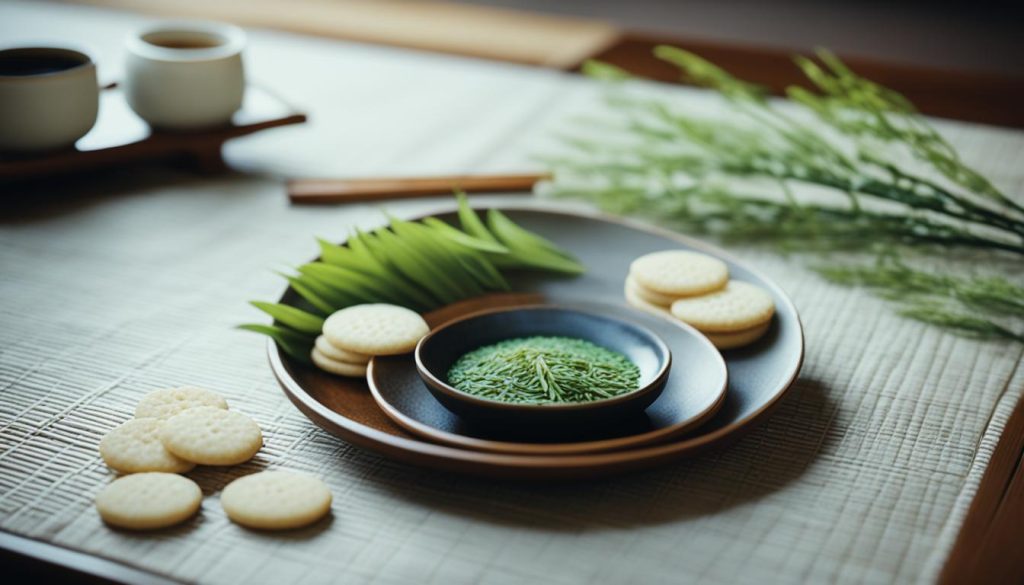
When enjoying this pairing, the nutty undertones of genmaicha complement the savory and crispy nature of the rice crackers. The aroma of the tea enhances the overall tasting experience, while the subtle bitterness of genmaicha is balanced by the mild sweetness of the rice crackers. This harmonious combination exemplifies the art of Japanese tea and food pairing, where the flavors of both elements come together to create a pleasurable and authentic culinary experience.
| Tea | Food |
|---|---|
| Genmaicha | Brown rice crackers (osenbei) |
Pairing Hojicha with Rich Japanese Sweets
Hojicha, a roasted green tea, offers a unique flavor profile that pairs exceptionally well with rich Japanese sweets. For a delightful contrast of flavors, we recommend pairing hojicha with yokan, a sweet red bean paste dessert.
The earthy and smoky notes of hojicha complement the sweetness of yokan, resulting in a harmonious and satisfying pairing. The roasted flavors of hojicha enhance the richness of the dessert, creating a delightful balance that is both comforting and indulgent.
Whether you are enjoying a traditional tea ceremony or simply looking to elevate your dessert experience, hojicha and yokan create a perfect combination of flavors. The earthy and nutty characteristics of hojicha beautifully complement the sweet and velvety texture of the red bean paste.
Next time you indulge in Japanese sweets, consider savoring them with a cup of hojicha for a truly delightful tea and dessert pairing.
Matcha and Nama Chocolate Pairing
The rich and bold characteristics of matcha make it an ideal pairing for indulgent sweets like Japanese ganache-textured chocolate, known as nama chocolate. The smooth and creamy texture of nama chocolate is enhanced by the bitter-sweet flavors of matcha. This pairing offers a delightful combination of rich and complex flavors.
Why Matcha and Nama Chocolate Pairing Works
In this pairing, the vibrant and earthy notes of matcha harmonize with the decadence of nama chocolate, creating a symphony of flavors. Matcha, a powdered green tea, provides a distinct umami taste that complements the creamy texture and intense sweetness of nama chocolate.
Matcha’s unique blend of sweetness and bitterness acts as a foil to the rich ganache-like texture of nama chocolate, resulting in a well-balanced and satisfying experience. The combination of these two indulgent treats brings together the depth of matcha’s flavor profile and the luxuriousness of nama chocolate.
Whether enjoyed as an after-dinner treat or as part of a special occasion, the matcha and nama chocolate pairing is sure to delight tea and dessert lovers alike.
Matcha and Nama Chocolate Pairing Menu Ideas
For those looking to explore the world of matcha and nama chocolate pairing, here are some menu ideas to get you started:
- Matcha Latte with Nama Chocolate Truffles: Begin with a comforting matcha latte made with frothy milk and a touch of sweetener. Pair it with decadent nama chocolate truffles for a luxurious treat.
- Matcha Green Tea Cake with Nama Chocolate Sauce: Indulge in a slice of moist matcha green tea cake drizzled with velvety nama chocolate sauce. The combination of the earthy matcha flavors and the rich chocolate sauce is simply divine.
- Matcha Affogato with Nama Chocolate Shavings: Prepare a classic affogato by pouring a shot of hot matcha over a scoop of vanilla ice cream. Sprinkle some finely shaved nama chocolate on top for added texture and indulgence.
Matcha and Nama Chocolate Pairing Suggestions
| Matcha | Nama Chocolate |
|---|---|
| Matcha Latte | Nama Chocolate Truffles |
| Matcha Green Tea Cake | Nama Chocolate Sauce |
| Matcha Affogato | Nama Chocolate Shavings |
Pairing Sencha with Cheesecake
When it comes to tea and dessert pairing, the combination of sencha, a well-balanced variety of green tea, and rich cheesecake is a match made in culinary heaven. Sencha’s subtle flavors perfectly complement the creamy richness of cheesecake, resulting in a harmonious balance of tastes. This delightful pairing highlights the unique characteristics of both the tea and the dessert, creating a refreshing and satisfying experience.
Sencha, known for its smooth and delicate flavor profile, enhances the indulgent nature of cheesecake. The tea’s grassy notes provide a refreshing contrast to the sweetness and creaminess of the dessert. Each sip of sencha after a bite of cheesecake allows the flavors to mingle on the palate, creating a symphony of tastes that tantalize the senses.
To fully enjoy this tea and dessert pairing, brew a cup of sencha using high-quality leaves and water at the appropriate temperature. The earthy undertones and gentle sweetness of sencha will elevate your cheesecake experience to new heights. Whether you’re enjoying classic New York-style cheesecake or experimenting with unique flavors like matcha or berry-infused varieties, sencha is the perfect accompaniment that will enhance the overall enjoyment of your dessert.
So, the next time you’re indulging in a slice of cheesecake, don’t forget to brew a cup of sencha to complete the experience. This tea and dessert pairing will take your taste buds on a journey of delightful flavors, leaving you refreshed and satisfied.
